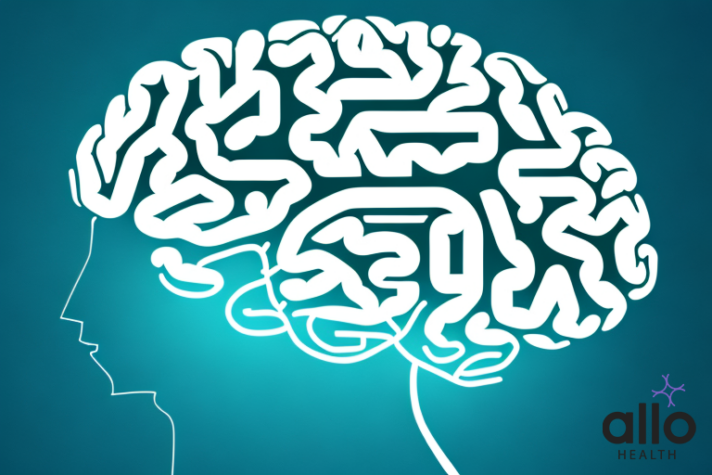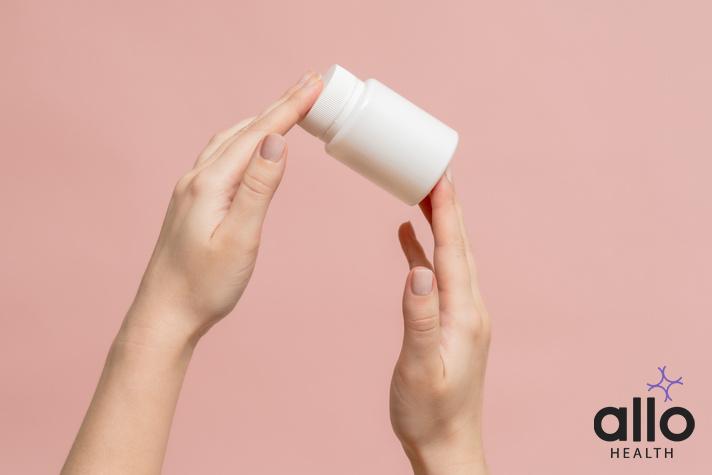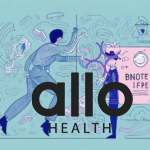The Link Between Adderall and Porn Addiction

Allo Health is dedicated to personalized well-being, offering support and trusted information tailored to individual health goals. The platform emphasizes human-generated content, led by a distinguished medical team of experts, including physicians and sexual health specialists. Their commitment to credibility involves rigorous fact-checking, authoritative research, and continuous updates to ensure accurate, up-to-date information. Allo Health's unique approach goes beyond conventional platforms, providing expert-led insights and a continuous commitment to excellence, with user feedback playing a crucial role in shaping the platform's authoritative voice.

Dr. Raj. R holds an undergraduate medical degree from the Philippines, and has a bachelors background in Psychology. His experience working in the field of urology further brought his interest forward in working towards his passion of understanding the science of attraction, intimacy, sex and relationships. A key motto he practices by remains unprejudiced and non-judgemental care.
Why This Was Upated?
Our experts continually monitor the health and wellness space, and we update our articles when new information became available.
Updated on 09 February, 2024
- Article was updated as part of our commitment to diversity, equity, and inclusion.

"The following blog article provides information about a drug or brand name drug and its potential effects or benefits. However, it is crucial to understand that this information is intended for general educational purposes only and should not be considered a substitute for professional medical consultation. It is highly recommended to consult with a qualified healthcare professional before making any decisions regarding medication, treatment, or healthcare management.
Book consultation
Individuals have unique medical conditions, and the information provided in this article may not be applicable to everyone. Only a qualified healthcare provider can evaluate your specific medical situation, taking into account your medical history, conducting appropriate tests, and providing personalized advice and recommendations. They are equipped to make informed decisions tailored to your individual needs.
It is crucial to emphasize that self-diagnosis, self-medication, or disregarding medical advice can have serious health consequences. This article may reference specific brand names or drugs for illustrative purposes. Mention of these names does not imply endorsement, recommendation, or guarantee of their efficacy or safety. The choice of medication should be based on discussions and individualized guidance from a healthcare professional who has a comprehensive understanding of your medical condition.
"Recent studies have shown a concerning trend among young adults who misuse Adderall: an increased likelihood of developing an addiction to pornography. This concern is of growing concern to medical professionals and mental health advocates, as the combination of Adderall and pornography can prove particularly problematic for those struggling with either addiction.
What Is Adderall?
Adderall is a prescription medication that contains two active ingredients: amphetamine and dextroamphetamine. These are central nervous system stimulants that affect neurotransmitters in the brain and nerves that contribute to hyperactivity and impulse control. Adderall is primarily used to treat attention deficit hyperactivity disorder (ADHD) and narcolepsy.
Here are some key details about Adderall:
- Purpose:
-
- ADHD Treatment: Adderall is commonly prescribed to individuals with ADHD to help improve focus, attention, and impulse control.
- Narcolepsy Treatment: It is also used to manage narcolepsy, a sleep disorder characterized by excessive daytime sleepiness and sudden attacks of sleep.
- Composition: Adderall is a combination of amphetamine salts, including amphetamine aspartate, amphetamine sulfate, dextroamphetamine saccharate, and dextroamphetamine sulfate.
- Mechanism of Action: Adderall works by increasing the levels of certain neurotransmitters in the brain, particularly dopamine and norepinephrine. These neurotransmitters play a role in regulating attention, focus, and impulse control.
- Forms and Dosages: Adderall is available in both immediate-release (IR) and extended-release (XR) formulations. The immediate-release version is usually taken multiple times a day, while the extended-release version is designed to provide a more sustained effect over a longer period.
- Side Effects: Common side effects may include insomnia, loss of appetite, weight loss, increased heart rate, and nervousness. It’s important to note that individual responses to Adderall can vary, and not everyone will experience the same side effects.
- Potential for Abuse: Adderall has the potential for abuse, as it is a stimulant. Misuse or overuse of Adderall without a prescription can lead to serious health risks, including addiction.
- Precautions and Contraindications: Adderall is not suitable for everyone, and there are certain medical conditions and medications that may interact adversely with it. It’s important to inform your healthcare provider about your medical history and any other medications you are taking.
- Monitoring: Regular monitoring by a healthcare professional is necessary for individuals taking Adderall to assess its effectiveness and manage any potential side effects or complications.
It’s crucial to use Adderall only under the supervision and guidance of a qualified healthcare professional. Taking it without a prescription or in ways not prescribed by a doctor can be harmful and may lead to serious health consequences. If you have concerns about Adderall or its use, it’s recommended to discuss them with a healthcare provider.
Adderall Uses & Benefits
Adderall is primarily prescribed for the treatment of attention deficit hyperactivity disorder (ADHD) and narcolepsy. Here are the details of its uses and benefits:
- Attention Deficit Hyperactivity Disorder (ADHD):
-
- Improves Focus and Attention: Adderall is known for its ability to enhance focus, attention, and concentration in individuals with ADHD. It helps in reducing impulsivity and hyperactivity, allowing individuals to better manage daily tasks and activities.
- Enhances Executive Functioning: Executive functions, such as planning, organizing, and problem-solving, are often impaired in individuals with ADHD. Adderall can help improve these cognitive functions, leading to better academic and occupational performance.
- Supports Behavioral Therapy: Adderall is often used as part of a comprehensive treatment plan for ADHD, which may also include behavioral therapy and educational interventions.
- Narcolepsy:
-
- Reduces Excessive Daytime Sleepiness: Narcolepsy is a sleep disorder characterized by sudden and uncontrollable episodes of daytime sleepiness. Adderall helps in managing narcolepsy by reducing excessive daytime sleepiness and improving wakefulness.
- Enhances Alertness: Individuals with narcolepsy often experience sudden and unexpected sleep attacks. Adderall can help them stay awake and alert during the day, improving their ability to function in various activities.
- Off-Label Uses: While not FDA-approved for these purposes, Adderall is sometimes used off-label for conditions such as treatment-resistant depression and cognitive enhancement in individuals without ADHD.

- Cognitive Enhancement: Some individuals without ADHD may misuse Adderall for its stimulant effects to enhance cognitive performance, concentration, and productivity. However, this is not a medically approved or safe use, and it can lead to adverse effects and potential health risks.
- Benefits in Academic and Occupational Settings: For individuals with ADHD, Adderall may contribute to improved academic performance and success in the workplace by addressing the core symptoms of the disorder.
- Individualized Treatment Plans: The benefits of Adderall can vary from person to person, and its effectiveness is often determined through a trial-and-error process. Healthcare providers work closely with patients to adjust the dosage and formulation to achieve the best balance between symptom relief and minimal side effects.
It’s important to note that while Adderall can provide significant benefits for those with ADHD and narcolepsy when used as prescribed by a healthcare professional, it also has the potential for abuse and should be taken only under proper medical supervision. Misuse of Adderall can lead to serious health risks, including addiction and other adverse effects. Always follow your healthcare provider’s instructions and communicate any concerns or changes in symptoms during the course of treatment.
Adderall Side Effects And Precautions
Adderall, like any medication, can cause side effects, and it’s important to take it under the supervision of a healthcare professional. Here are details about Adderall side effects and precautions:
Common Side Effects:
- Insomnia: Adderall is a stimulant that can lead to difficulty falling asleep or staying asleep. Taking the medication earlier in the day or adjusting the dosage may help alleviate this side effect.
- Loss of Appetite: Some individuals may experience a reduced appetite, which can lead to weight loss. Regular monitoring of weight and nutritional intake is important, especially in growing children.
- Increased Heart Rate: Adderall can cause an increase in heart rate and blood pressure. Individuals with pre-existing cardiovascular conditions should use Adderall with caution and under close medical supervision.
- Nervousness and Restlessness: Stimulants like Adderall can lead to feelings of nervousness, restlessness, or anxiety. Adjusting the dosage or trying an extended-release formulation may help minimize these effects.
- Gastrointestinal concerns: Common gastrointestinal side effects may include nausea, stomach pain, and constipation.
Less Common Side Effects:
- Dizziness: Some individuals may experience dizziness or lightheadedness. It’s important to avoid activities that require alertness, such as driving, until the effects are known.
- Dry Mouth: Stimulants can cause a dry mouth, and staying hydrated can help alleviate this symptom.
- Mood Changes: In some cases, individuals may experience mood changes, including irritability or mood swings. It’s important to report any significant changes in mood to a healthcare provider.
Serious Side Effects: While rare, serious side effects can occur. Seek immediate medical attention if you experience:
- Chest Pain or Palpitations: These could be signs of cardiovascular concerns and should be addressed promptly.
- Shortness of Breath: Difficulty breathing may be a serious side effect that requires immediate medical attention.
- Allergic Reactions: Severe allergic reactions, though rare, can occur. Seek emergency medical help if you experience symptoms like rash, itching, swelling, severe dizziness, or difficulty breathing.
Precautions and Considerations:
- Medical History: Inform your healthcare provider about your complete medical history, including any cardiovascular concerns, high blood pressure, mental health conditions, or a history of drug or alcohol abuse.
- Medication Interactions: Some medications can interact negatively with Adderall, including certain antidepressants and MAO inhibitors. Always inform your healthcare provider about all medications and supplements you are taking.
- Pregnancy and Breastfeeding: The safety of Adderall during pregnancy and breastfeeding is not well-established. Discuss potential risks and benefits with your healthcare provider.
- Monitoring: Regular monitoring by a healthcare professional is essential to assess the effectiveness of Adderall, adjust dosages if necessary, and manage any side effects.
- Avoiding Misuse and Abuse: Adderall has the potential for misuse and abuse. It should only be used by the person for whom it was prescribed and according to the prescribed dosage.
It’s crucial to communicate openly with your healthcare provider about any concerns or side effects you may be experiencing. They can provide guidance on managing side effects and adjust the treatment plan as needed. Never adjust your dosage or stop taking Adderall without consulting your healthcare provider. If you experience severe or persistent side effects, seek medical attention promptly.
The Link Between Adderall and Porn Addiction

The relationship between Adderall (amphetamine and dextroamphetamine) and porn addiction is a complex and controversial topic. It’s important to note that while Adderall is a medication prescribed for conditions like ADHD and narcolepsy, it has the potential for misuse and can lead to various side effects, including changes in behavior and habits. However, the direct link between Adderall use and the development of porn addiction is not well-established, and the available evidence is limited.
Here are some points to consider:
- Increased Focus and Concentration: Adderall is known for its ability to enhance focus and concentration, which may lead individuals to engage in certain activities more intensively. In some cases, this could include extended periods of online activities, such as watching pornography. However, not everyone who takes Adderall will develop problematic behaviors.
- Impulsivity and Risk-Taking: Some individuals may experience increased impulsivity and risk-taking behavior as a side effect of Adderall. This could potentially contribute to engaging in activities, including the consumption of pornography, without sufficient consideration of the consequences.
- Individual Differences: Responses to Adderall can vary widely among individuals. While some may find increased focus and productivity, others may experience negative side effects, including changes in behavior. Factors such as individual differences, dosage, and the presence of other mental health conditions may influence how someone responds to the medication.
- Underlying Mental Health Conditions: Both ADHD and addiction (including pornography addiction) are believed to have connections with neurobiological factors, such as dopamine dysregulation. Individuals with ADHD may be more vulnerable to developing addictive behaviors, but it’s essential to consider that ADHD and addiction are separate conditions with different diagnostic criteria.
- Psychosocial Factors: The development of addictive behaviors, including pornography addiction, is often influenced by psychosocial factors such as stress, relationship concerns, and personal vulnerabilities. The use of substances like Adderall may interact with these factors, potentially influencing behavior.
It’s crucial to approach these discussions with nuance and avoid making blanket statements about the relationship between Adderall and specific behaviors. If someone is concerned about their use of Adderall or feels that it may be contributing to problematic behaviors, it is important to consult with a healthcare professional. Open communication with a healthcare provider can help address concerns, adjust treatment plans if necessary, and provide appropriate support.
Furthermore, if someone is struggling with addictive behaviors, including pornography addiction, seeking guidance from mental health professionals, such as psychologists or counselors, is recommended. They can provide comprehensive assessments and therapeutic interventions to address underlying concerns and support individuals in making positive changes.
Most Asked Questions
-
Can Adderall Use Lead to Porn Addiction?
There's no direct evidence linking Adderall use to porn addiction. While the drugs can have an effect on focus and impulsivity, the improvement of addictive behaviors is stimulated with the aid of different factors, such as person differences, psychosocial aspects, and underlying intellectual health situations.
-
Does Adderall Increase the Likelihood of Engaging in Pornographic Activities?
Adderall's number one reason is to deal with ADHD and narcolepsy, no longer to influence engagement in specific activities. While expanded focus and impulsivity may also occur as facet effects, it does not necessarily result in multiplied participation in pornographic sports for absolutely everyone.
-
Is There a Connection Between ADHD, Adderall, and Porn Addiction?
The dating between ADHD, Adderall use, and porn addiction is complicated. Individuals with ADHD may also have a higher vulnerability to addictive behaviors, however it's crucial to recognize that ADHD and addiction are wonderful conditions. Adderall is prescribed to manage ADHD signs and symptoms and does not inherently cause addiction.
-
Can Adderall-Induced Impulsivity Contribute to Pornographic Behavior?
While Adderall can growth impulsivity in some people, it is important to notice that impulsivity manifests in a different way in diverse people. While some can also interact in impulsive behaviors, which include immoderate net use, others won't. Personal factors and dosage ranges can impact these outcomes.
-
Should Individuals on Adderall Worry About Developing Porn Addiction?
Concerns about developing porn dependancy even as on Adderall need to be addressed with healthcare experts. Open verbal exchange lets in for an assessment of individual responses to the medicine, potential side effects, and any impact on conduct. Monitoring and adjusting treatment plans can assist manage such concerns efficaciously.






































